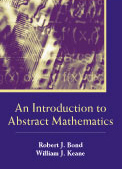1. Mathematical Reasoning
Statements / Compound Statements / Implications / Contrapositive and Converse
2. Sets
Sets and Subsets / Combining Sets / Collections of Sets
3. Functions
Definition and Basic Properties / Surjective and Injective Functions / Composition and Invertible Functions
4. Binary Operations and Relations
Binary Operations / Equivalence Relations
5. The Integers
Axioms and Basic Properties / Induction / The Division Algorithm and Greatest Common Divisors / Primes and Unique Factorization / Congruences / Generalizing a Theorem
6. Infinite Sets
Countable Sets / Uncountable Sets, Cantor's Theorem, and the Schroeder–Bernstein Theorem / Collections of Sets
7. The Real and Complex Numbers
Fields / The Real Numbers / The Complex Numbers
8. Polynomials
Polynomials / Unique Factorization / Polynomials over C, R, and Q
Answers and Hints to Selected Exercises

323 pages, $82.95 list
1-57766-539-2
978-1-57766-539-7
© 1999
paperback
Instructor's Solutions Manual available
eBook availability
An Introduction to Abstract Mathematics
Bond and Keane explicate the elements of logical, mathematical argument to elucidate the meaning and importance of mathematical rigor. With definitions of concepts at their disposal, students learn the rules of logical inference, read and understand proofs of theorems, and write their own proofs— all while becoming familiar with the grammar of mathematics and its style. In addition, they will develop an appreciation of the different methods of proof (contradiction, induction), the value of a proof, and the beauty of an elegant argument. The authors emphasize that mathematics is an ongoing, vibrant discipline—its long, fascinating history continually intersects with territory still uncharted and questions still in need of answers.
The authors’ extensive background in teaching mathematics shines through in this balanced, explicit, and engaging text, designed as a primer for higher- level mathematics courses. They elegantly demonstrate process and application and recognize the byproducts of both the achievements and the missteps of past thinkers. Chapters 1-5 introduce the fundamentals of abstract mathematics and chapters 6-8 apply the ideas and techniques, placing the earlier material in a real context. Readers’ interest is continually piqued by the use of clear explanations, practical examples, discussion and discovery exercises, and historical comments.
The authors’ extensive background in teaching mathematics shines through in this balanced, explicit, and engaging text, designed as a primer for higher- level mathematics courses. They elegantly demonstrate process and application and recognize the byproducts of both the achievements and the missteps of past thinkers. Chapters 1-5 introduce the fundamentals of abstract mathematics and chapters 6-8 apply the ideas and techniques, placing the earlier material in a real context. Readers’ interest is continually piqued by the use of clear explanations, practical examples, discussion and discovery exercises, and historical comments.